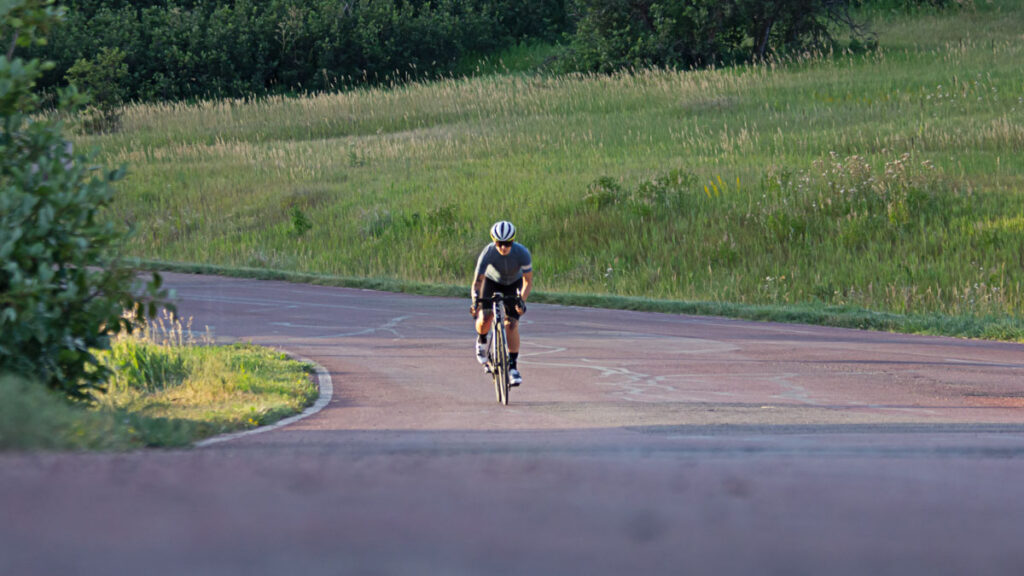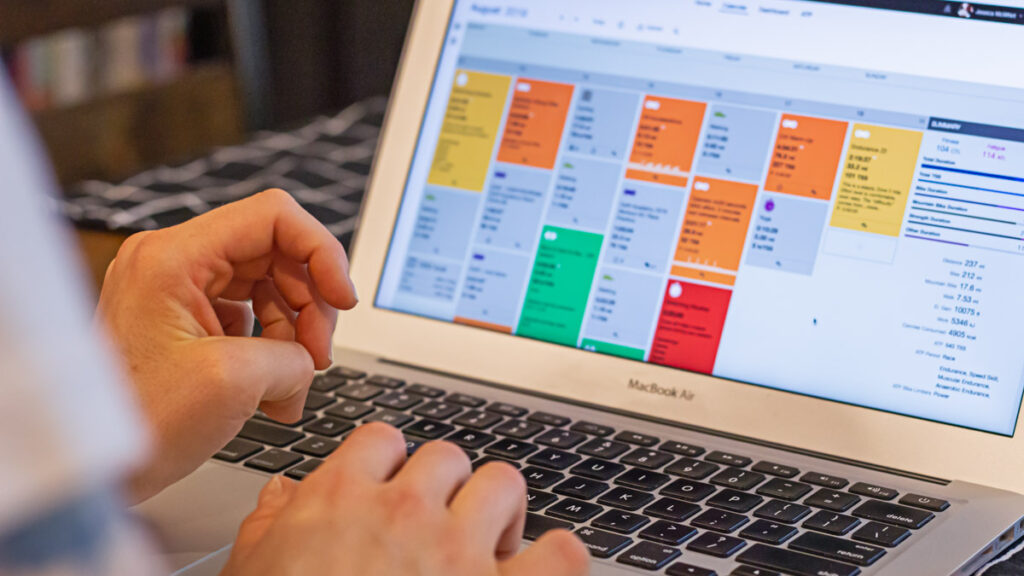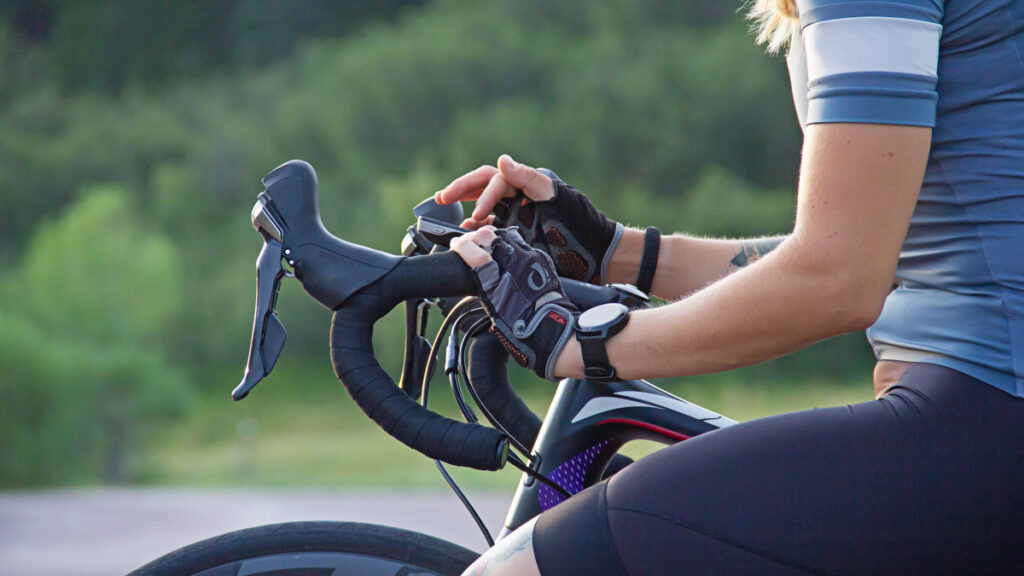Jessica McWhirt is a Cat 3 road racer and Vice President for Pedal RACING. She recently re-established the Women’s Development Committee within the Bicycle Racing Association of Colorado (BRAC) Board of Directors. She started her own podcast, Grin and Grind it, to highlight local WTF (women/trans/femme) athletes doing amazing things, she contributes weekly to her own blog, she’s a freelance copywriter and a cycling coach. When she finds free time, Jessica will usually spend it on two wheels (road, mtb, cx) with her husband, Chris, or walking to their local diner where the waiters know their orders by heart.
TrainingPeaks: What’s your background in sports?
Jessica McWhirt: Well, we could go back to high school, when my friend wanted me to join a soccer team and I literally ran away from the practice. I thought exercising, or really training, was kind of like a form of punishment for eating ice cream. Then I met my friend Jared and he got me into cycling. The only other person I knew who was a cyclist was my 55-year-old uncle Don, so that’s what I thought of, but I ended up getting really into it.
I did a local 100-mile Fondo called Elephant Rock, and from there just started trying to get faster, and getting more and more into the metrics and nerding out on the data. I started racing three years ago, and now it’s a big part of my life.

What was your most memorable event?
Oh man, the one I always talk about the most wasn’t even a race. It was my first 80-mile ride, and I just totally broke down 10 miles from home. I was like, “Jared, I need to sit on this bench, I’m gonna lose my sh*t.” So he had to just wait around and wait for me for like 20-30 minutes. We could have just been cycling right? But I was at my wit’s end.
Luckily Jared has the most patience of any person I’ve ever met. I was sitting there holding my face in my hands, telling myself, “you’re not going to have your mom come pick you up from this ride.” I’ve done Triple Bypass, I’ve done the Double-Triple Bypass, and I’ve never been so emotionally jacked up as I was on that first 80-mile bike ride. Once you get past that point, it gets so much easier.
Now you’re racing on a local team, right?
Yeah, pedal RACING. I was thinking about it this morning, and I still can’t figure out how I was introduced to the idea of a cycling team; I thought racing was just for professionals. I don’t know how I thought you go from not being on a team to being in the Tour de France, but it didn’t occur to me that anyone could just join a local bike racing team.
So are you more of a roadie or mountain biker?
I would say more of a roadie; I’m continually trying to cat up and get better at road cycling. But I do like to race mountain bikes because of the challenge—and I take it less seriously. I mean, I still want to win because I’m just competitive like that, but I focus more on having fun and learning new skills, whereas with road I take it probably too seriously.
I was sitting there holding my face in my hands, telling myself, “you’re not going to have your mom come pick you up from this ride…”

Go back to how you tend to nerd out on metrics; do you approach most things in life that way or is that a training thing?
I’ve never been “data-driven” but I am super analytical in all parts of life. As an undergrad, I loved being able to analyze and critique the things I was reading, so I’ve probably always had that mindset—but the data in cycling didn’t hit me until I realized what an FTP number meant, and how you can increase that or, I guess, make no change if you don’t work toward it.
I was like, “Well I obviously want to get stronger on the bike, so how do I do that?” And it really comes down to what gets measured gets managed. When you have that number glaring at you, it’s hard not to want to raise it. So you have to figure out the data and the sorts of workouts you need to do to get that. The TrainingPeaks workout builder is perfect. I love using that thing to create a workout and then import it to my device.
Do you train inside a lot?
It depends, I love going outside, don’t get me wrong, but I love the trainer for structured workouts. It’s hard to hit really specific numbers outside because the landscape varies so much.
It really comes down to what gets measured gets managed. When you have that number glaring at you, it’s hard not to want to raise it.

It sounds like you’ve made a lot of progress in a short time frame, what has made the biggest difference for you?
Consistency, hands down. If you want to get anywhere you have to take steps every single day toward your goal. TrainingPeaks is a perfect program to keep you consistent; you build your workouts and you can schedule them as far in advance as you want. I use the ATP setting to schedule my A, B and C races; TrainingPeaks shows you the base and build phases from there. Then I just try to hit the number that it gives me for each week.
I don’t know what I would do if I wasn’t using TrainingPeaks, I’m so dependent on it now. I would probably have to recreate it in an excel spreadsheet, which sounds like the biggest pain!
So what’s your goal for the season?
To cat up to a 2. I have 12 points right now and I need another 18, so, we’ll see. I’m realizing I shouldn’t just have results-oriented goals, I need to start being more holistic and work on other things that don’t have to have a result. It’s hard when you do have a results goal, and you don’t reach it, you’re like well what the hell’s this all for?
That’s part of why I raced with the men last week. I knew there was no chance I was going to get on the podium, so I just focused on group dynamics, bike handling skills—basically navigating through swarms of men. I actually like racing with men sometimes, it’s so much more dynamic, there are races within the race, but it’s intense! Women are just as competitive as men, but we’re still communicative; we all like to have our idea of self-preservation whereas these guys were just full throttle, bumping elbows—it was wild!
I remember when I first started racing it scared the sh*t out of me to line up with 10 women, and now I’m racing in a field of 70 guys—it definitely gave me more confidence. Lining up with any number of women is gonna feel like nothing after last weekend. So I’m trying to come up with more goals like that.
I remember when I first started racing it scared the sh*t out of me to line up with 10 women, and now I’m racing in a field of 70 guys!

Can you tell me a little about your women’s development committee with BRAC?
Let’s see, how much history should I give you? In undergrad I heard about the vagina monologues; I thought the word vagina was really awkward to say, but I was really intrigued by it. I went to Barnes and Noble and I’d pick up the book, read a couple of pages and put it back. I was like, “I’m not gonna buy it, it has the word vagina on it!”
Finally, I bought the book, read it in a day, and was like, “Okay, I want to get involved in something bigger than myself.” I ended up directing a production of Vagina Monologues for five years. Toward the end, I met my friend Jared who got me into cycling, so I already had the women’s equality thing in the back of my head.
The more bike events I went to the more I noticed that there weren’t as many women as there were men, I’d notice the events themselves were geared toward men also; like at one the jerseys only came in men’s sizes. When I started getting into racing, I’m lining up with 10 women whereas men have a full field. It can just be a really bro culture, and not super inviting for someone to get into.
I’ve always been super vocal about it, and Sean, the director of BRAC, invited me to join the board. I didn’t just want to get new people racing, I wanted to improve the environment for women currently racing too, so we came up with a survey to send to the current members. It was like 10-12 questions, and 100 people responded out of the 500 who were registered. Ultimately we found out that women want more clinics, more events, they want events to be more inclusive.
I sent the survey results to the BRAC board and started calling different development programs in different states to find out what was working and what wasn’t. I talked to people in NYC, Seattle, and Philly and came up with a good plan. Then, oh jeez, it took months to get it off the ground.
The more bike events I went to the more I noticed that there weren’t as many women as there were men

This is all a volunteer effort? It sounds like a full-time job!
Yeah exactly, it got to the point where I was like, “I need help, I can’t do this by myself!” But we finally got the board on top of it, they agreed to do this initiative. Initially, we pissed off a lot of people by saying in our motto that we wanted to be inclusive of transwomen and folks who were gender nonconforming. We had a teammate on pedal who is non-gender binary, and the way they were treated at races just broke my heart. I wanted to make sure that people like my friend Ash, can show up to a race and feel like they’re allowed to be there. If you’re paying to race you should be more than welcome.
A lot of people thought we were going to change the rules for transwomen, but we’re a small organization; we have no rights to change rules. We’re just trying to set a more inclusive precedent.
Cycling is still a bit of a boys club, so the whole idea was to put something in motion to change it. So far we’re calling it “Women’s Plus.” We had a bike night, with a ton of big names: we had Cari Higgins, Margot Clyne, Katie Compton, Meredith Miller, and Jen Sharpe, and we had like 50 people come, which was really cool. In April we had our first big clinic, which was a full day on general road racing. We followed that with clinics on Time Trialing, Hill Climbing, Road Racing, and Criteriums.
We’ve had about 17 women register for each one; I wish it was bigger, but ya know, better than nothing! So far most people have been encouraging and positive about it, so hopefully, we’ll eventually drown out the haters.
What would you have done if you hadn’t started bike racing?
It’s crazy how life works out. I went to school for undergrad in political science and English, thinking that I would become a speechwriter for politicians. I always had a thing with working for the government. I interned for the Irish minister of European affairs, and I started to get my grad degree out there in international security and conflict. I thought I would work with the CIA or FBI, and I did several different internships thinking it would lead to some sort of job, but it was incredibly difficult. I tried for five years to get in with the CIA or FBI, but I just could not do it.
That’s when I decided to take the path of least resistance. I reached out to Dave at Primal, because I wore their jerseys. I ended up working there for a year and getting involved with more for the cycling stuff. Then I took on a personal training job, and then Strava reached out to me based on my work history, and I worked for them for a year. It just became one of those passion things that kept leading to jobs!
If something is important to you, you’ll find a way to get it done.

What do you say to people balancing work with life?
I mean, I’ve coached people with jobs that require a lot of time, and then they have kids and stuff, but I tell them: you’ll make time for what you want. Just like people make time for TV or scrolling through social media, if something is important to you, you’ll find a way to get it done.
TrainingPeaks can help you plan out the week ahead, knowing what’s going on. I mean a 30-45 minute workout is better than not doing anything. As long as you’re doing something every day toward your goal, you’re going to eventually reach it.
You can follow Jessica on Instagram: @jessica_mcwhirt, Website: www.jessicamcwhirt.com and Twitter: @jessica_mcwhirt







